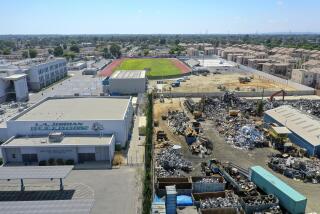Jewish Immigrants Turn Trash Into Gold, Jobs : Salvaging: Soviet newcomers extract precious metals from worn-out batteries and printed circuit boards.
- Share via
JERUSALEM — Immigrant Jewish scientists from the Soviet Union are living the dream of ancient alchemists as they turn garbage into gold, silver and platinum in a project inspired by an 88-year-old rabbi from Brooklyn.
Hydrometallurgist Solomon Flaks holds a pile of worn-out printed circuit boards, thrown on the scrap heap like millions of others. On his desk is a gleaming 24-carat gold nugget gleaned from the boards.
“We can get 300 to 800 grams (10 to 28 ounces) of pure gold from a ton of these boards in hours, rather than weeks, at about half the price and none of the pollution of other processes,” he said.
Other scrap, such as mercury from batteries and coal ash, also yields precious metals for the company, called Satec.
Soviet immigrant Herman Branover set up the firm in 1987 after Brooklyn Rabbi Menachem Schneerson, scion of the mystical Lubavitch Jewish movement, urged action on behalf of Soviet scientists frustrated by the lack of jobs in Israel.
“Over 50% of Soviet Jews are university graduates and everybody is getting out. If we want these Jews to settle here, we must provide them with jobs in their professions,” Branover said.
There are no bubbling crucibles or magic symbols at the Satec plant. Inside a modern building in a high-tech industrial zone on the edge of Jerusalem, its white-coated scientists glide through pastel-carpeted offices. The loudest sound is the hum of the air-conditioning.
Satec forecasts some $450,000 in sales this year from its chemical gold mine.
It also expects to earn $3.75 million from manufacturing home heating elements and an advanced electric power meter.
Profits are plowed back to provide more jobs and homes for the stream of Soviet Jews arriving in Israel daily. Their numbers have been boosted by the relaxation of Soviet travel regulations, fears of a rise in anti-Semitism at home and a tightening of U.S. visa requirements.
Publication of exact figures is banned under an Israeli government press blackout but at least 33,000 Soviet Jews arrived during the first four months of 1990 and Treasury officials forecast that 150,000 will have come by the end of the year.
A government report has criticized arrangements to house, school and care for the newcomers as woefully inadequate. Career opportunities are few in Israel’s stagnant economy.
Some fear the influx will worsen the country’s 9% unemployment rate. They say the newcomers’ welfare and medical needs could strain the budget unbearably.
Branover points to Satec as a model to help Soviet immigrants to become largely self-supporting.
He says the company, started three years ago with $2.7 million, largely from private donations, is now about to make a profit. It has provided work for 35 immigrants and plans to employ 100 more over the next year.
A loan fund set up by Revlon Cosmetics chairman Ronald Perlman provides cheap mortgages in a company housing project with 52 homes completed and 150 more to be built shortly.
Satec is also helping Israel’s economy. It spent more than $1 million in 1988 buying local materials and services. Exports make up more than half its sales.
It has sold power meters to Belgium’s Nuclear Power Authority and the Rotterdam Europort in the Netherlands, among others, and says a major Canadian mining company is interested in its ore extraction process.
Company policy is to marry the scientific know-how of the Soviet scientists to the sales and marketing skills of 12 immigrants from Britain and the United States.
“The Russians are more advanced than the West in some aspects of metallurgy and mechanical engineering but very bad at marketing,” said Branover.
Satec tries to teach its Soviet recruits the facts of Western business life and Branover says they are eager pupils. “They are sick and tired of communism and readily accept the free market approach,” he said.
With the Soviet Union eager to upgrade its industrial and commercial capability, Branover sees opportunities for Israel, with its growing pool of Russian-speaking capitalists and ties to the United States, to act as a bridge between East and West.
“We are getting letters from the Soviet Union from people interested in joint ventures and have signed an agreement with the Soviet Academy of Sciences to develop joint projects,” he said. “The potential is great.”
More to Read
Inside the business of entertainment
The Wide Shot brings you news, analysis and insights on everything from streaming wars to production — and what it all means for the future.
You may occasionally receive promotional content from the Los Angeles Times.









